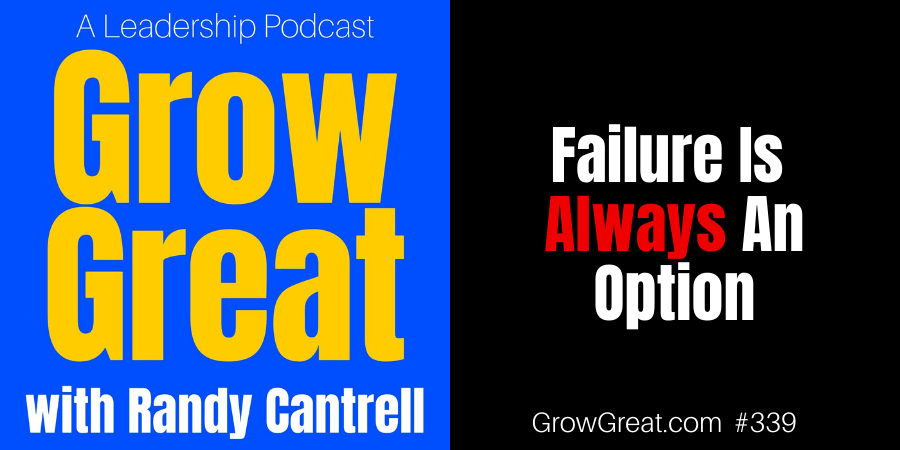Podcast: Play in new window | Download (Duration: 8:54 — 8.6MB)
Subscribe: Apple Podcasts | Spotify | RSS | More
“Failure is not an option.”
Another platitude that sounds good, but is colossally wrong. Failure is possible in everything. And probable, too. That’s just the truth. Fact.
Does that mean you should fear it? Not necessarily.
More importantly, you should likely prepare for it. Not by bracing for it, but by planning worst-case-scenario. So often failure is preventable if we’d just prepare going in.
Business owners can live in their heads, preparing for success. Sure, we can also fret about failing, but our imaginations soar at the thoughts of what might be – in all the best ways! That’s why we create proformas that are nothing but dreams. Figments of our imagination.
We love doing it. Creating a spreadsheet with calculations of what might be. Man, look at that. If we can close just a few more deals every month it’ll add a few million bucks to our top line. And if we add a few million bucks to the top line, lookie there! We’ll add over $300,000 to our bottom line. Awesome.
Of course, experience teaches us – often the hard way – that most of the time that “best-case scenario” never happens. Instead, we hit numbers we never did a spreadsheet on. Turns out we end up closing a few less deals every month and suddenly our gross revenue is down a few million bucks. Now what?
Every savvy business person knows the maxim, “Formulas over feelings.” We’re a pretty intuitive bunch though so I think it’s empty advice to ignore how we feel about something. Many of us have a good gut feel about things. It why we often make decisions that seem ridiculous to our friends. We believe in things. Mostly in ourselves. And our ideas or solutions.
Even so, there’s wisdom in the phrase that we’d be foolish to ignore. The numbers need to make sense. We can help leverage our feelings by looking more realistically at numbers.
It’s a common practice to ask, “What’s the worst thing that can happen?”
It’s a far less common practice to actually answer it.
That’s why I’m urging you to do. Take the time to figure out the answer. Figure out those formulas. Get those numbers. Then see how you feel.
Knowing that failure is always an option doesn’t necessarily prevent us from moving forward, but it can help us increase our faith in what we’re doing. Or not.
Let’s illustrate the point with buying merchandise to sell. Suppose I’m able to buy a truckload of some items at a greatly reduced cost. Suppose a truckload consists of about 60 units that currently have a real street price of $300. That’s $18,000 in gross revenue potential. Our profit margin at that price would be 30%, giving us a profit of $5,400. That’s 7% more profit than we’d earn if we purchased the items in small quantity. So far so good. But what’s our rate of sale. If it takes us 120 days to sell 60 units and the terms on our purchase are net 30 days, then it may not be worthwhile. We can fool ourselves into thinking we’ll make the purchase and sell these units at a faster rate than normal. Best case scenario.
The worst-case scenario would be calculating that our current rate of sale won’t hold up. What if it takes us 150 days or more to sell all 60 units? What if the current street price won’t hold up and we end up having to mark down the items? Answering those questions will likely alter how we feel about this opportunity.
Every day we’re making decisions like this. Decisions that make or break our day, our week, our month and our year. Sometimes we calculate things carefully. Sometimes we don’t. We all do it.
Mindfulness is one way we can avoid getting caught in the option of failing. It doesn’t mean we have to slow down. We just need to be aware – sometimes MORE aware – of what the stakes are. That’s why you frequently hear the sage advice, “Know your numbers.”
Intuition and feelings are critical for every business owner I’ve ever known. Knowing the realities of the numbers is paramount so we give our gut feelings the best chance to guide us toward success.
Get real with what can actually happen. Don’t be pessimistic, but figure things won’t go as planned. What if they don’t go anywhere close to plan? Will it be a good decision then? Figure it out. Calculate the risk you’re willing to make. Then act.
I’ll wager that your results will prove success is more likely time after time. Your winners will overcome any failures. You won’t ever get rid of failure. You just have to win against it more often than not.
Be well. Do good. Grow great!
Randy
